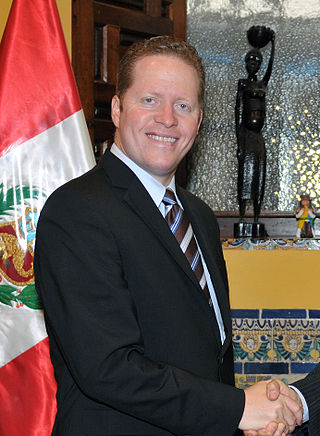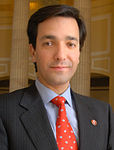
The New Progressive Party is a political party in Puerto Rico that advocates statehood. The PNP is one of the two major parties in Puerto Rico with significant political strength and currently holds both the seat of the governor and of the resident commissioner.

Luis Guillermo Fortuño Burset is a Puerto Rican politician who served as the governor of Puerto Rico, an unincorporated territory of the United States, from 2009 to 2013.

David Enrique "Quique" Bernier Rivera is a Puerto Rican dentist and politician that has served in various roles in public service in Puerto Rico. Bernier first served as executive director of the Office of Youth Affairs of Puerto Rico and was later confirmed as the youngest Secretary of Sports and Recreation of Puerto Rico in history. Four years later, he was unanimously confirmed as Secretary of State of Puerto Rico for the administration of Alejandro García Padilla. He was the 2016 candidate for Governor of Puerto Rico of the Popular Democratic Party.

General elections were held in Puerto Rico on Tuesday, November 4, 2008, to elect the officials of the Government of Puerto Rico that would serve for the next four years, most notably the Governor of Puerto Rico.

Pedro Rafael Pierluisi Urrutia is a Puerto Rican politician and lawyer currently serving as governor of Puerto Rico since January 2, 2021. He has previously served as secretary of justice, resident commissioner, acting secretary of state, de facto governor of Puerto Rico and as private attorney for Puerto Rico's fiscal oversight board under the Puerto Rico Oversight, Management, and Economic Stability Act. He is a member of the New Progressive Party and the Democratic Party of the United States.

The political party strength in Puerto Rico has been held by different political parties in the history of Puerto Rico. Today, that strength is primarily held by two parties, namely:

The Popular Democratic Party is a political party in Puerto Rico that advocates to continue as a Commonwealth of the United States with self-governance. The party was founded in 1938 by dissidents from the Puerto Rican Liberal Party and the Unionist Party and originally promoted policies on the center-left. In recent years, however, its leaders have described the party as centrist.

Alejandro Javier García Padilla is a Puerto Rican politician and attorney who served as the governor of Puerto Rico from 2013 to 2017.
Rafael Cox Alomar is a Puerto Rican lawyer, professor of law, author and 2012 candidate for Resident Commissioner of Puerto Rico.

The 2008 New Progressive Party primaries were the primary elections by which voters of the New Progressive Party (PNP) chose its nominees for various political offices of Puerto Rico, namely the position of governor, for the 2008 general elections. Resident Commissioner Luis Fortuño was selected as the nominee at the primary elections held on March 9, 2008. He would go on to win the 2008 general election as well.

The 2012 New Progressive Party primaries were the primary elections by which voters of the New Progressive Party (PNP) chose its nominees for various political offices of Puerto Rico for the 2012 general elections. They were held on March 18, 2012 and coincided with the Republican Party primaries in the island.
A referendum on the political status of Puerto Rico was held in Puerto Rico on November 6, 2012. It was the fourth referendum on status to be held in Puerto Rico. Puerto Rico has been an unincorporated territory of the United States since the Spanish–American War in 1898.

A constitutional referendum was held in Puerto Rico on 19 August 2012. Voters were asked whether they approve of two amendments to the constitution: one to eliminate the absolute right to bail and the other to decrease the number of members of the Legislative Assembly. Despite support from the party in government and part of the main opposition party, both amendments were rejected by voters.

The 2012 Puerto Rico Senate election was held on November 6, 2012, to elect the members of the Senate of Puerto Rico for the next four years, from January 2, 2013 until January 1, 2017.

The free association movement in Puerto Rico refers to initiatives throughout the history of Puerto Rico aimed at changing the current political status of Puerto Rico to that of a sovereign freely associated state. Locally, the term soberanista refers to someone that seeks to redefine the relationship between Puerto Rico and the United States to that of a compact with full sovereignty. The term is mostly used in reference to those that support a compact of free association or a variation of this formula, commonly known as Estado Libre Asociado (ELA) Soberano, between Puerto Rico and the United States. Members of the independence movement that are willing to pursue alliances with this ideology are occasionally referred to as such, but are mostly known as independentistas. Consequently, soberanismo then became the local name for the free association movement.
The 2012 Puerto Rico government transition process is the ongoing process in Puerto Rico regarding the government transition between the outgoing governorship of incumbent Governor Luis Fortuño and the incoming governorship of Alejandro García Padilla, governor-elect. The process is mandated and regulated by Law No. 197 of 2002 and started on November 13, 2012, three working days after the Puerto Rican general election of 2012 as the law requires, once García Padilla was preliminarily certified as Governor-elect by the State Elections Commission.

General election were held in Puerto Rico on Tuesday, November 8, 2016, to elect the officials of the Puerto Rican government to serve from January 2017 to January 2021, most notably the Governor of Puerto Rico. Ricardo Rosselló was elected governor and Jenniffer González-Colón was elected Resident Commissioner. The elections saw a 23 percentage point drop in turnout and was the lowest voter turnout in Puerto Rican history.

General elections were held in Puerto Rico on November 3, 2020, to elect the officials of the Puerto Rican government who will serve from January 2021 to January 2025, most notably the position of Governor and Resident Commissioner. In addition, there was a non-binding status referendum to ask voters if Puerto Rico should become the 51st state of the Union.

A special election to elect shadow senators and shadow representatives from Puerto Rico was held on May 16, 2021. Voters chose two special delegates to the United States Senate and four special delegates to the United States House of Representatives. Their work is to demand that the US Congress respect and enforce the results of the 2020 status referendum, and admit Puerto Rico as the 51st state of the Union.

The 2024 Puerto Rico gubernatorial election will be held on November 5, 2024, to elect the governor of Puerto Rico, concurrently with the election of the Resident Commissioner, the Senate, the House of Representatives, and the mayors of the 78 municipalities. Incumbent New Progressive Party Governor Pedro Pierluisi Urrutia is running for re-election to a second term in office.

















